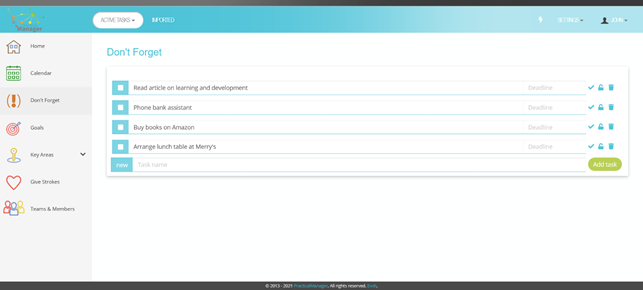Don’t Forget section
The Don’t Forget section is for the minor tasks which you must remember to do some time, but which are not part of the major tasks and projects in your key areas.
The don’t forget division is for small on-off tasks,
- Which do not take much time
- Which do not need following-up
- Which require little energy
- Which can be done any time

Examples of minor one-off tasks: reading and article, making an appointment with the dentist, tidying up a cabinet, ringing for training course prospects, returning a book, sending a thank you letter.
The more of these you have, the more difficult it is to set priorities. You run a greater risk of getting side-tracked and being controlled by the sequence in which things happen.
You will be more organised if you use your Don’t forget instead of loose paper scraps.
How to use the Don’t forget section
Get used to making a note of minor tasks in the Don’t forget section instead of sending yourself an e-mail message – as soon as they occur. It saves you trying to remember them.
Do your minor tasks:
- When gaps occur in your day; i.e. short intervals which cannot be otherwise occupied.
- When your energy is low; i.e. when you do not feel able to start a new, major tasks.
- When the risk of being interrupted is high. When it is difficult to continue working undisturbed.
You will be able to get minor tasks done without losing track of the overall goals and without breaking up the periods when you can concentrate on your major, important tasks. Go through your Don’t forget section regularly. If a minor task is getting urgent, transfer it to a daily plan by entering a start date. If a minor task has to be done on a specific day, transfer it in the tasks section of the daily calendar.
Sequence of tasks
The sequence in which people do their various tasks has a major impact on the quantity and quality of their achievements.
It is tempting to start the day by doing a few minor tasks – “to get them out of the way” or to “warm up”. But by doing so, it is easy to break a period of otherwise uninterrupted time. This breaks out the day, so that only minor tasks get done.
Approach your tasks from the other end. Whenever ever possible, take the major, demanding tasks first and fit the small tasks into “the gaps”: after you finish a major task, before you start a new major task, before you go lunch or right after you are back, etc. You can only do this if the minor tasks are easy to find and not mixed up with lots of other tasks – or even e-mails.
